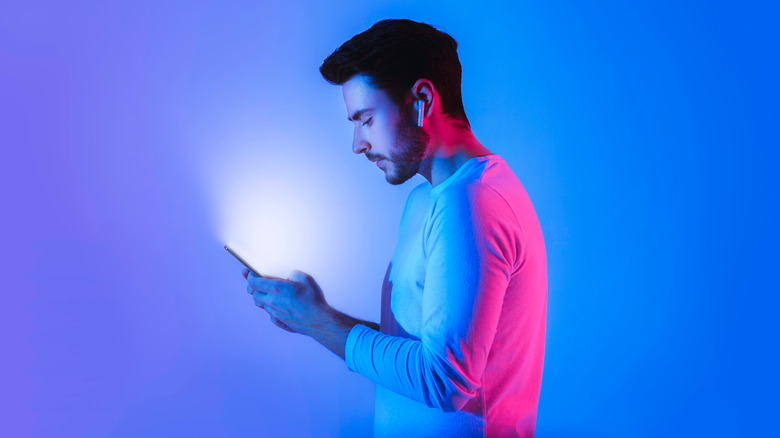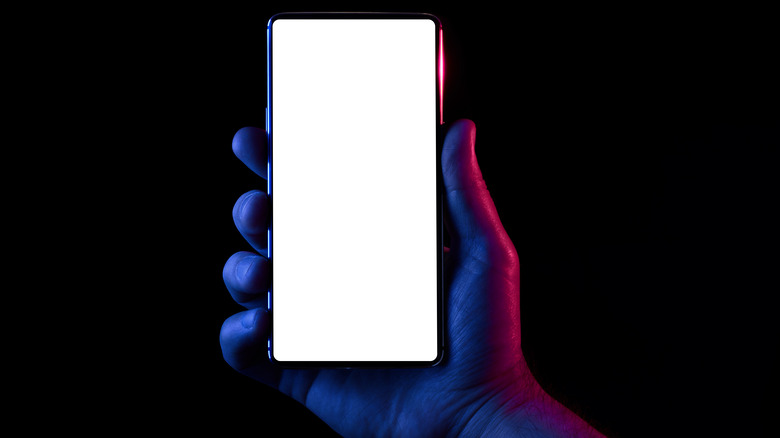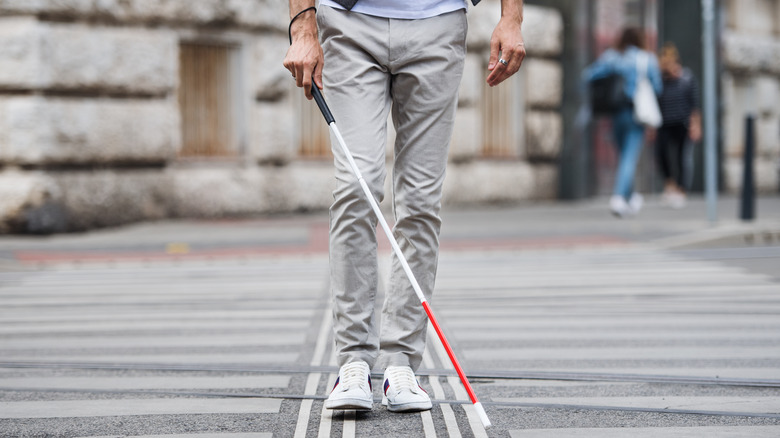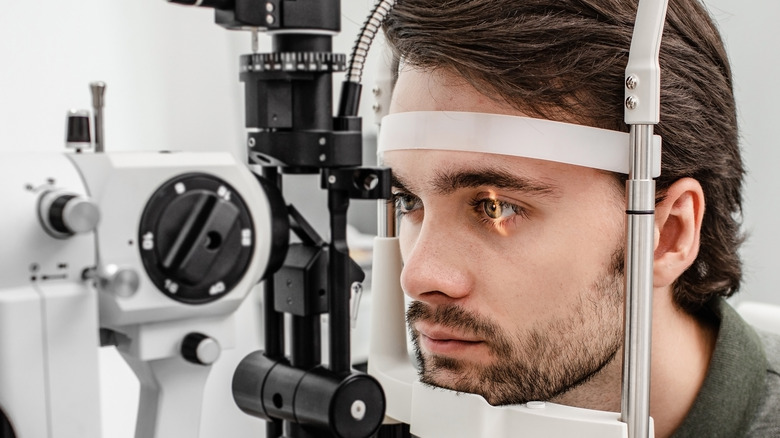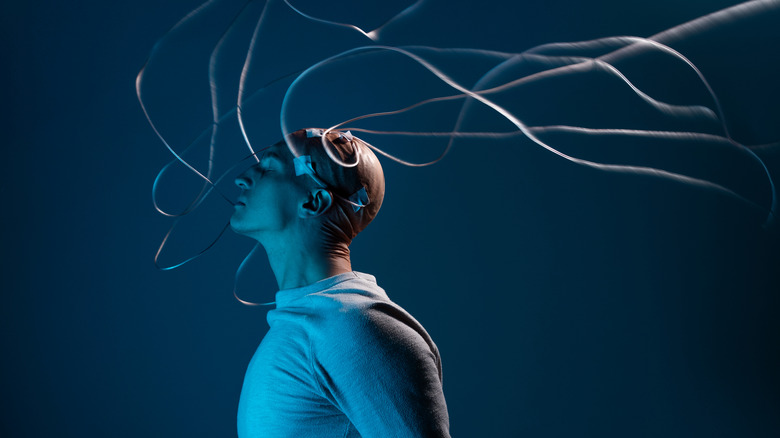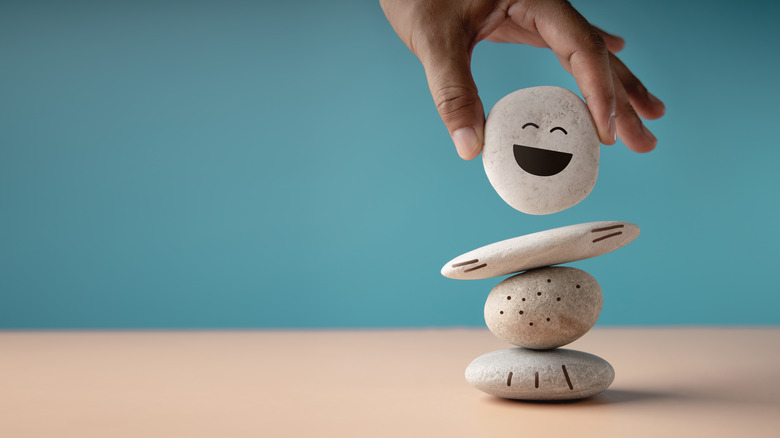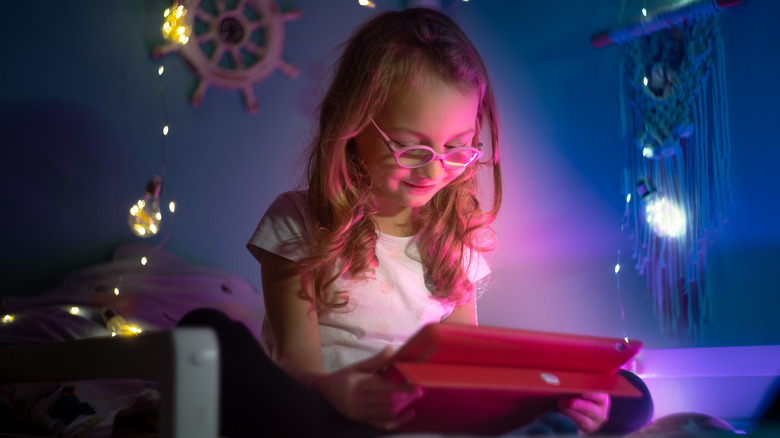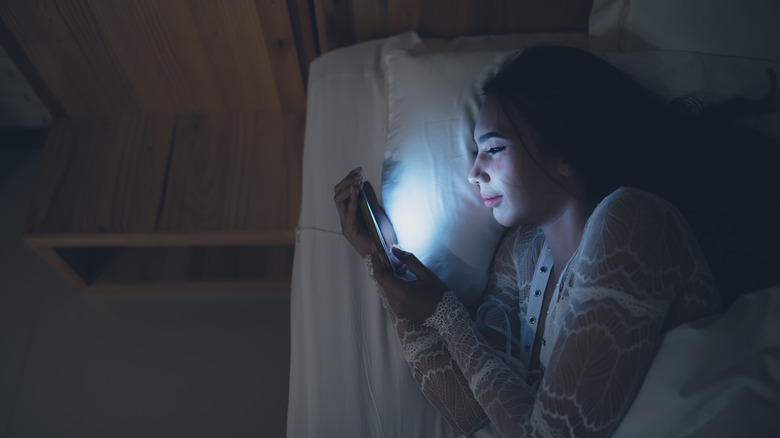Everything You Need To Know About Blue Light
We are now more culturally aware of blue light than ever before. Not because it didn't exist before, but because the landscapes of employment and entertainment have shifted in recent decades. The sheer amount of screens that we come into contact with on a daily basis has people absorbing, refracting, and filtering more blue light than ever. In fact, it seems like nearly every aspect of life is tethered to a screen. From YouTube videos for entertainment and working out, to employment and digital socializing, you probably have a computer at you fingertips almost always. And let's not forget texting, and FaceTime with friends and family on your blue-light-emitting phone or some other device — along with, yes, reading articles.
All of that's to say, blue light is ubiquitous and could be causing potential harm to your health (via Healthline). As more people discover the consequences of a screen-heavy lifestyle, how we navigate through a digitized world healthfully has become a big concern. And you might be thinking: "Is there anything I can do to combat the harmful effects that blue light has on my body?"
The light you cannot see
Electromagnetic waves surround you every day, emitted from technologies that you rely on every single day. Blue light is one of the many types of electromagnetic activity that you come into contact with, including blue light waves that exist in the sky, as well as being emitted from your devices. It can be difficult to conceptualize things you can't see, and blue light is no exception — you trust that it exists. Blue light is also emitted from fluorescent and incandescent lightbulbs (via Healthline).
Energetic waves exist on a spectrum that spans from large to small, with shorter waves producing more energy than their longer counterparts. The main reason why blue light has become a mounting concern is because LED/LCD devices also emit blue light. Our mobile phones, computers, and tablets are all LCD screens. LED screens are a specific type of LCD screen. Since we are now relying on our devices more than ever, we are exposed to more blue light.
Blue light overexposure
Research regarding the harm that blue light may or may not cause is ongoing. The natural, anatomical structure of your eyes can protect the more sensitive structures, like the retina, from being damaged by some forms of light. Studies have shown that these protection mechanisms don't prevent blue light from reaching your retinas, which further emphasizes the question — what kind of damage is blue light doing to your eyes?
While many experts believe that blue light may not harm your retinas, other studies pinpoint exactly what kind of damage overexposure to blue light might be doing to you on a more holistic level. Experts noted that while the research is current, LED devices are relatively new and that gazing into them hour after hour is a routine not yet fully understood. And so, there aren't any studies examining the long-term effects of blue light exposure from LED screens, because they simply have not been around long enough to totally grasp the ramifications, according to Healthline.
So, is blue light harmful? Yes. No. Maybe.
Your eyeball molecules and blue light
Some studies have shown that blue light exposure can lead to macular degeneration, a common eye complication in older adults. The macula is a small piece of the retina, and as it thins with age and use, it can lead to blurred vision (via the Mayo Clinic). While macular degeneration is one of the leading causes of blindness, further studies concluded that blue light might not play a role in this degeneration.
In a 2018 study, it was stated that blue light can change the makeup of your eyeball molecules, making them toxic (via Insider). In the study, researchers exposed cells to blue light and tracked the reactions. They found a link between blue light exposure and the change in structure of a run-of-the-mill molecule into a molecule linked to macular degeneration. Once exposed to blue light, the molecule turns into one that kills healthy eye cells, thus leading to retinal degeneration. However, the American Academy of Ophthalmology (AAO) rebuked the conclusions of this study and noted the data is "unfounded."
Is blue light from your devices is leading to inevitable blindness? Researcher Ajith Karunarathne, replied, "Absolutely not." Author Dan T. Gudgel, AAO, said laboratory studies regarding the transformation of retinal molecules are "alarmist" and cannot be applied to "real people in the real world." The American Academy of Ophthalmology reported that those earlier studies were performed on cells that didn't come from the retina and that the experiments conducted didn't mimic the way blue light interacts with retinal cells in the human body.
Your eyes are impacted
In short, blue light affects your eyes, though not in the dramatic ways you've probably heard whisperings about. One of the main eye-specific concerns that the American Academy of Ophthalmology has is that staring into a screen can inhibit the body's natural inclination to blink. This means that you end up blinking less than you should, which messes with the health of your eyes.
When you spend too much time staring into a screen, you neglect to look beyond it, further affecting your eye health. In combination with the less-than-average amount of blinking, your eyes can start to feel dry and strained. According to eye doctors, there is a rule to combat these negative side effects. They call it the 20-20-20 rule — looking at something that is at least 20 feet away, for 20 seconds, every 20 minutes during screen time. This break can help prevent your eyes from feeling gritty and strained. Ultimately, that seems like a pretty reasonable solution, doesn't it?
The brain's response to blue light
When you take the time to look at the body as a holistic entity, it seems like blue light might affect your brain, too, not just your eyes. According to MedicineNet, light is a huge environmental factor when it comes to the influence it has on our brains. Interestingly, blue light activates the biggest response in our brains. Exposure to blue light is directly linked to much of your health, well-being, and bodily rhythms — especially if that blue light is from the sun, the original source of blue light.
Blue light has been used to help regulate moods and alertness. Your exposure to blue light, especially at specific times during the day, can affect your circadian rhythms. This impact trickles down and influences your hormones, resulting in imbalances within the brain. Dopamine and serotonin levels — both of which are in control of your mood regulation — are thrown off by sleep disruptions. So, yes, blue light from devices does affect your brain, but harnessing its power may actually benefit your brain, not hurt it (via MedicineNet).
Become aware of your mental health
Since blue light affects the way your hormones are produced, it is not particularly surprising to discover that your mental health is affected by exposure to it as well. Excessive exposure to blue light can inhibit the correct rhythms of hormone secretions, leading to mood disorders and even depression. This is partly why many experts recommend avoiding blue light-emitting devices before bedtime — because the rhythm disruptions can lead to hormone imbalances, which can cause depression or depressive symptoms (via MedicineNet).
One of the ways that MedicineNet recommends combatting these mental health impacts is by ensuring you are getting plenty of natural sunlight during the day. While blue light can disrupt your circadian rhythm and result in sleeping complications, allowing yourself to soak up the benefits of natural blue light during the day can combat some of these symptoms. Researchers also recommend using a dim red light as a night light and taking advantage of "night mode" on your devices, which shifts to having red undertones instead of blue.
The impact of blue light on sleep
Since blue light comes from the sun and helps send a signal to your brain that it is time to awaken and start the day, it should come as no surprise to learn that the blue light emitted from your devices can mess with your fragile circadian rhythm, as mentioned above. Your circadian rhythm is your body's natural internal clock, which cycles every 24 hours. Harvard Health reported, "The circadian rhythm of people who stay up late is slightly longer, while the rhythms of earlier birds fall short of 24 hours." Daylight, and environmental blue light, help your internal clock stay on track.
According to Harvard Health, exposure to light at nighttime can gradually shift your body's circadian rhythm and melatonin production. This is especially true for blue light since it has a stronger effect than the light emitted by lamps. Researchers have noted that while exposure to blue light can affect sleep patterns, not getting enough sleep can lay the foundation for diseases such as obesity, heart disease, and diabetes. As of 2021, a direct link between these diseases and blue light does not exist. However, researchers caution to limit blue light exposure at nighttime so that you can maintain your circadian rhythm and hopefully prevent future illnesses.
Children might be more vulnerable
While much of the retinal damage caused by blue light in adults is still under research, some experts hypothesize that it might be more damaging to children's eyes. Because their lenses are less developed, kids absorb less short-wavelength light. This ultimately means that more blue light can reach a child's retina when compared to an adult's. But researchers at the American Optometric Association and Optometry Cares are quick to point out that the long-term effects of blue light exposure from tech devices and its relationship to children are not well-understood.
They also stated that the blue light emitted from devices is not powerful enough to damage the human retina. However, the researchers made it clear that blue light can drastically affect circadian rhythms, which can be particularly difficult for children (and their parents) to cope with. According to WebMD, blue light exposure has a more dramatic impact on the circadian rhythms of teenagers when compared to adults. The recommendation is that screen time be limited before bedtime to help promote a more natural circadian rhythm (via the AOA).
The weight gain and diabetes factor
Unfortunately, this is the area where research has been producing less-than-stellar conclusions regarding blue light exposure. Specifically, since blue light exposure at night can mess with your circadian rhythm, it influences the amount and quality of the sleep you are getting. When light rays hit your eyeballs, it signals your body to slow the production of melatonin — and melatonin is what causes sleepiness. But it also increases the secretion of cortisol and ghrelin, which are hormones that cause you to feel awake and, well, hungry (via WebMD).
This is partly why researchers are studying nighttime exposure to blue light as a contributing factor to weight gain and metabolic dysfunction. Nighttime blue light-emitting devices have been shown to increase hunger-inducing hormones while also decreasing the amount of insulin produced. When insulin is lacking, your body has a much harder time turning the food you eat into "fuel" that can be stored in your muscles for future use. This leads to the fuel being stored in your blood, contributing to weight gain and diabetes. WebMD even cited a study that found a link between high rates of obesity and how illuminated the participants' cities are.
Blue light has benefits
Since some of the blue light that you come into contact with is a result of Mother Nature shining her oh-so-lovely sun rays, you might wonder: Are there any health benefits to blue light? In short, yes! There are benefits to blue light exposure. MedicineNet stated that absorbing au naturel blue light from the sun for an hour in the mornings can help increase your energy throughout the day.
When used in a health-promoting capacity, blue light actually has the ability to ease the symptoms of seasonal affective disorder (SAD). SAD is a form of depression that most often affects people living at the top or bottom of the globe, as it is related to the amount of sunlight they experience during seasons with shorter days. When used this way, blue light can suppress the amount of melatonin produced, leading to those suffering from SAD feeling more alert and awake than without blue light therapy. This kind of therapy is also helpful with dementia, jet lag, sleeping disorder, non-seasonal affective depression, and more (via MedicineNet).
Blue light-blocking glasses
Blue light-blocking glasses have gained popularity, according to Everyday Health, especially as more people transition to #workfromhome life. Research regarding blue light-blocking glasses is inconclusive, however. The glasses might help filter out some of the high-energy blue light waves before they can reach your retinas. But, since the data stating that blue light can harm your retinas is undetermined, so are claims about blue light-blocking glasses protecting them. One study did conclude that blue light-blocking glasses have a positive effect when it comes to maintaining a natural circadian rhythm. Also, according to the Mayo Clinic Health System, investing in a pair of anti-glare glasses can help protect your eyes from strain — this is especially true for children.
However, Everyday Health noted that blue light-blocking glasses are unlikely to prevent digital eye strain, dry eyes, and headaches, as those are thought to be side-effects caused by blinking less while you gaze into your screens. They also reported that because the FDA does not yet regulate blue light-blocking lenses, it can be challenging to discern if the ones you have are high-quality. It's recommended you purchase glasses with blue light-blocking lenses from an optometrist to ensure effectiveness. Aside from that, limiting screen time and remembering to look away from your screen and blink every so often can help prevent digital eye strain, explained WebMD.
Cut down on screen time before bed
Cutting down on screen time might seem like an impossibility if your job requires you to put in eight or more hours on your computer every day. Fortunately, according to WebMD, simply initiating the 20-20-20 rule during daylight hours spent in front of a screen can help lessen the symptoms of digital eye strain. And they are quick to state that reducing screen time before bed can offer huge benefits.
WebMD recommends shutting down screens about three hours before bedtime since this has been proven to aid in your body's melatonin production. By allowing your body to produce melatonin — and not inhibiting it by exposing yourself to blue light — you can get a more restful night's sleep. More restful sleep can impact your overall health by allowing your body to fully recover from the stress and strain you might experience every day.


